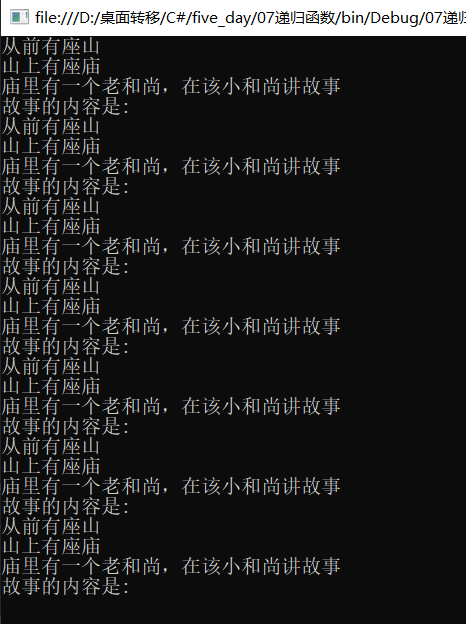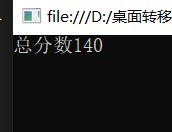C#:递归函数的使用、out 、ref、params修饰符号的使用\方法的重载
递归函数的使用:
public static int i = 0; //定义一个静态变量
public static void Test()//定义静态函数
{
Console.WriteLine("从前有座山");
Console.WriteLine("山上有座庙");
Console.WriteLine("庙里有一个老和尚,在该小和尚讲故事");
Console.WriteLine("故事的内容是:");
if (i > 5)
{
return; //没有返回任何的返回值,这里仅仅是为了跳出函数
}
i++;
Test(); //函数的递归
}/*1.递归函数简单的理解就是在函数体中调用自己函数本身,相当于一层一层的嵌套,但是在进行返回的时候,也需要一层一层的退出*/
运行结果:

out参数修饰符的使用:
using System;
using System.Collections.Generic;
using System.Linq;
using System.Text;
using System.Threading.Tasks;
namespace _03out参数
{
class Program
{
static void Main(string[] args)
{
#region 返回值是同一类型的数据,通常使用数组进行接收
//int[] nums = { 1, 2, 3, 4, 5, 6, 7, 8, 9 };
//int[] res = new int[4]; //用于接收返回值
//res = GetMaxMinSumAvg(nums );
//Console.WriteLine("最大值:{0},最小值:{1},总数:{2},平均值{3}",res[0],res[1],res[2],res[3]);
//Console.ReadKey();
#endregion
#region 计算数组的最大值、最小值、平均值、总和,并且返回的数据的类型是不同的
//int[] nums = { 1, 2, 3, 4, 5, 6, 7, 8, 9 };
////这里的变量不用进行赋值,在函数调用中将会被赋值
//int max;
//int min;
//int sum;
//int avg;
//string grade;
//GetMaxMInSumAvg(nums, out max, out min, out sum, out avg, out grade);
//Console.WriteLine("最大值:{0},最小值{1},平均值{2},总数{3},等级为{4}", max, min, avg, sum,grade);
//Console.ReadKey();
#endregion
//使用自己编写的数据类型转换函数进行数据的转换:
Console.WriteLine("请输入需要转换的数值:");
string str = Console.ReadLine();
int result;
bool b = MyTryParse(str,out result );
Console.WriteLine("转换后的整数{0},是否转换成功{1}",result,b );
Console.ReadKey();
}
/// <summary>
/// 计算一个数字中的最大值、最小值、总数、平均值 ,返回的值都是同一类型的数据
/// </summary>
/// <param name="nums">函数的形式参数,需要参与计算的数组</param>
/// <returns>计算结果的返回值</returns>
public static int[] GetMaxMinSumAvg(int[] nums)
{
int[] res = new int[4];
res[0] = nums[0]; //max
res[1] = nums[0]; //min
res[2] = 0; //sum
for (int i = 0; i < nums.Length; i++)
{
if (nums[i] > res[0])
{
res[0] = nums[i];
}
if (nums[i] < res[1])
{
res[1] = nums[i];
}
res[2] += nums[i];
}
res[3] = res[2] / nums.Length;
return res; //返回一个数组
}
/// <summary>
/// 计算数组的最大值、最小值、平均值 以及总数,并且返回的参数的类型是不同的类型,对于返回参数不同通常使用out修饰符号将不同的参数进行返回
/// </summary>
/// <param name="nums"></param>
/// <param name="max"></param>
/// <param name="min"></param>
/// <param name="sum"></param>
/// <param name="avg"></param>
public static void GetMaxMInSumAvg(int[] nums, out int max, out int min, out int sum, out int avg, out string grade)
{
max = nums[0];
min = nums[0];
sum = 0;
for (int i = 0; i < nums.Length; i++)
{
if (nums[i] > max)
{
max = nums[i];
}
if (nums[i] < min)
{
min = nums[i];
}
sum += nums[i];
}
avg = sum / nums.Length;
if (sum > 90)
{
grade = "优秀";
}
else
{
grade = "loser";
}
}
/// <summary>
/// 数据类型的转换,实现自己的TryParse(),将字符串转换称为数字
/// </summary>
/// <param name="str"> 需要转换的字符串</param>
/// <param name="result"> 转换以后返回的结果</param>
/// <returns></returns>
public static bool MyTryParse(string str,out int result )
{
result = 0;
try
{
result = Convert.ToInt32(str);
return true ;
}
catch {
return false;
}
}
}
}
ref修饰符的使用:
{
static void Main(string[] args)
{
//交换两个变量
int n1 = 20;
int n2 = 13;
Ecxchange(ref n1,ref n2);
Console.WriteLine("交换后的数据:{0}\t{1}",n1 ,n2);
Console.ReadKey();
}
/// <summary>
/// 交换传入的两个参数值
/// </summary>
/// <param name="n1"> 第一个参数</param>
/// <param name="n2">第二个参数</param>
public static void Ecxchange(ref int n1,ref int n2) {
int temp;
temp = n1;
n1 = n2;
n2 = temp;
}
}
/* 1.总结; ref关键字的作用是将带入的参数进行值的改变,将改变后的结果带出
* 2.在进行参数传入的时候必须进行附初始值*/
params修饰符号的使用:
static void Main(string[] args)
{
int[] nums = { 45, 56, 78, 89, };
int sum=GetSum("张三",2,56,6,78); //虽然该函数的形式参数是数组,但是在使用params的时候可以直接参数一串数字
Console.WriteLine("总分数{0}", sum);
Console.ReadKey();
}
/// <summary>
/// 计算非特定长度数组中的数据的总和
/// </summary>
/// <param name="nums"> 非特定数组</param>
/// <returns>返回的计算结果</returns>
public static int GetSum(string name ,int id ,params int [] nums)
{
int sum = 0;
for (int i = 0; i < nums .Length; i++)
{
sum += nums[i];
}
return sum;
}
}
注意:
/*
1. params 将同一类型的数据转换成为该类型的数组,并且在作为形式参数类型的时候,放在参数列表的最后面,
2.参数列表中有且只有一个这样类型的参数
*/
运行结果:

方法的重载:
static void Main(string[] args)
{
int n1 = 10;
int n2 = 54;
string str1 = "Hello";
string str2 = "World";
Console.WriteLine(GetSum(n1,n2));
Console.WriteLine(Getsum(str1 ,str2));
Console.ReadKey();
}
public static int GetSum(int n1, int n2)
{
return n1 + n2;
}
public static string Getsum(string str1, string str2)
{
return str1 + str2;
}
/*1.方法的重载,其方法的名称必须是相同的,但是参数的类型,和参数的个数必须有一个是不同的,这样才能曾为是方法的重载
2.方法的重载与方法的返回值无关
*/




